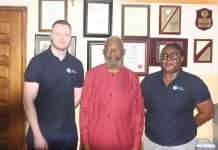In continuation of the drive towards ensuring national drug security, the Director General, National Agency for Food and Drug Administration and Control (NAFDAC), Prof. Mojisola Adeyeye, has disclosed that there are ongoing plans to ensure the country is no longer solely dependent on other countries for all its drug needs.
Adeyeye, who gave the assurance in an exclusive interview with Pharmanews, stated that the agency is already in discussions with international experts to provide training for interested investors and manufacturers on the production of both Active Pharmaceutical Ingredients (APIs) and non-active ingredients to boost local drug manufacturing in the country.

She explained that such an initiative is what the country needs, especially at this time of global health crisis, adding that government is interested in collaborating with manufacturers on the proposed local production, which, according to her, has the potential of boosting the nation’s Gross Domestic Product. Below is the full text of the interview:
Considering the restriction on drug exportation from India, is there any collaboration between NAFDAC and the Federal Ministry of Health to boost local drug manufacturing in Nigeria?
Local manufacturing, whether it is Active Pharmaceutical Ingredients (APIs) or the finished products, cannot happen overnight because of the resources involved. But there are plans on ground to make it happen, especially with what we are experiencing during this COVID-19 pandemic.
I have said it so many times, since I became NAFDAC DG, that drug insecurity is one of our critical issues in Nigeria and nobody was paying attention. Recently, I was at the CBN event to discuss next steps for Nigeria, in light of the coronavirus outbreak, the sharp drop in crude oil price, approximately 25 dollars per barrel now, and its effects on products manufacturing, the healthcare sector and others.
People perish without a vision, is a common saying. If the vision is not there, there can’t be any output. The coronavirus crisis that is hitting the world now may be a wakeup call and that was the subject of my discussion at the CBN event. The meeting had the “who is who” in the manufacturing and healthcare sector in Nigeria, with about 200 to 300 persons in attendance, including the ministers of finance, works, transport and others.
My major concern is the availability of drugs in Nigeria. Talking of Universal Health Coverage, without the availability of drugs, Universal Health Coverage is dead on arrival. Presently, Nigeria imports 70 per cent of its drugs and unfinished products, including raw materials, and the packaging. So it is a crisis, and the collaboration suggested by the PSN president is a great one. It shows that we have caught the vision that we are in a crisis.
If it comes to a time that the medicine you are supposed to buy for 2000 naira is being bought for 10000 and above, that is, five times higher than the actual price, then there is a problem. I am not sure whether that has really hit us hard enough, but it probably has, with the remarks of the CBN Governor, Godwin Emefiele. He mentioned the fact that we cannot make a single API in Nigeria, as we have to import everything, even sanitizers.
Although he said we shouldn’t import sanitizers again, I don’t know whether he will put that into policy. What of the raw materials we are going to use in making the sanitizers? We cannot make them and that is the problem we have. We import all materials, except water, for pharmaceuticals.
What is the way forward in resolving these challenges?
Emefiele gave us a little of hope that the government may be ready to collaborate with investors to make non-active ingredients, like starch, lactose and magnesium stearate. It will be a great development if we can make non-active ingredients in Nigeria. Even if it is 10 per cent of the actives we can make, those items are the ones we will not need to import, and definitely, that will be a boost to our GDP. We can also export to other African countries to boost our economy, because we are the biggest.
Emefiele’s statement made me to know that we are possibly catching the vision. Before the coronavirus crisis, we had the problem of drug insecurity, and if China is ill, NAFDAC is dead, because if India imports 70 per cent of their actives from China, and India puts an embargo on this, they won’t be able to share all these things with anyone. Although I do not blame them; they have to think of their citizens first, while we are left to think of our citizens too.
There will be a series of meetings very soon with Emefiele and a few of us. It doesn’t have to be manufacturers of finished products who are also doing APIs. It is not everyone that is interested or that has knowledge of science that can manufacture APIs or non-manufacturing actives. No thanks to our university system, our students are not well prepared. Thus, we have to think of bringing experts from outside the country to train a group of people that are interested in manufacturing of APIs because it is medicinal chemistry.
It could be called a refresher course, as I had intended earlier before the coronavirus outbreak. My colleague at a university in China was going to come and have two weeks of lectures and start preparing whoever was interested in the science. What do you do when you want to manufacture acetaminophen? What are the things that you know from the science perspective and from the safety perspective? Because, in manufacturing of APIs, you have to think of the environment. How do you handle the wastes?
These are the types of things I have in mind for APIs, but it is not going to happen overnight – which means we are in a strait, so to say, for the next two years. I pray coronavirus will not persist. If it does, the next two years will be hard, very hard. That is even if we have already put a strategy on ground that, at the end of two years, we will start manufacturing one or two things. But, right now, there is nothing on the horizon.
Integrated medicine is already taking place in other parts of the world but it appears less imbibed in Nigeria, despite being abundantly blessed with different medicinal plants. Why is Nigeria not really embracing it?
We have started something already. In March last year, we formed a herbal medicine committee. It is a national committee, made up of NAFDAC, Ministry of Health and researchers from different parts of the world.
NAFDAC has a long list of herbal medicines that have been in existence.The reason for bringing the herbalists and researchers together in terms of doing more work is to quickly identify and characterise the herbal products; so we formed that committee.
We also found that there is mistrust between the herbalists and the academic researchers because there had been issues. The herbalists were not willing to release their intellectual properties because of copyright.
To resolve this, we created focus groups to look into different topics. We told each group to write a report on its topic. We found that there are more herbalists than researchers that came, and they conveyed that they wanted NAFDAC to be the manager, because they know that if NAFDAC is involved, it can be monitoring and safeguarding the interest of all parties.
I really don’t want NAFDAC to be involved because it is between herbalists and researchers; we were only trying to foster a smooth relationship. We don’t mind if it is just two or three products that can be developed from the collaboration. The main goal of all this is to have, at least, five to 10 natural products or herbal medicines that can go into hospitals and be used.
I researched into the sickle cell medicine and found that in vivo study refers to experimentation using a whole living organism as opposed to a partial or dead organism. But ex vivo refers to taking blood samples from sicklers and looking at the blood cells before administering medicine into the tube in the lab. We saw a reversal of the sickle cell. Sicklers are prone to infections, especially at the early stage. It is not just that the product is anti-sickling, it is also antibacterial.
The herbalists and the researchers have to come to an agreement, in which they will need to formalise a research and look for fund, because to do clinical trial, one needs a lot of money. For the university researchers, they can go to TETfund (Tertiary Education Trust Fund) to get money. I am sure they will help, especially when NAFDAC is the midwife of the different groups.
Still on herbal medicine, herbal concoctions have been found to be one of the causes of kidney problems in the country. What is the agency’s plan to control the circulation?
The plan is enforcement. In Jos, we went after hawkers to seize their wares. Prosecution was minimal, and we keep sanctioning them. We even seized their vehicles that they used in propaganda too. It is a continuous process, but we also need a lot of resources, as we can’t go after them with okadas. We have to go with police and also with a vehicle to get them. The government supports us for salaries and not to pay high vehicles. We intend to increase our staff strength. We intend to add more staff and tackle so many things.
The display and sales of sachet alcoholic drinks is still a major problem at the bus stops. How do we tackle them?
We have done a lot and we are scaling it up. The ministry of health and NAFDAC met with brewery companies and manufacturers about a year and a half ago. We told them they had to take it off the market. They asked what to be done to those that had been employed and the machineries they had bought for the process.
We then agreed that, first, they had to reduce the alcohol levels and they would do corporate social responsibility adverts, boldly telling the public that their products cannot be used by children.
Currently, there are buses that have “no underage drinking of alcohol” as billboards patrolling major cities in the country. I saw two in Abuja some days ago and, of course, they are also on different radio stations. They have invested over N100 million to commence the campaign, because I told them they needed to scale it up, as corporate social responsibility demands.
So we agreed that, by 2023, there won’t be sachet alcohol production, because we also want to clear everything; and it takes a while to be sure that we fade it out.
What can be done to curtail drug abuse in it?
Part of the problem was the fact that we were not at the ports for seven years. It didn’t just start with marijuana; it started with narcotics. In terms of enforcement, controlling and distribution, the manufacturers took advantage of our absence at the ports and drugs were coming in, aside from what was manufactured here, even codeine.
As part of our own commitment, we started Youth Against Drug Abuse (YADA) using the Young Pharmacists Group (YPG) to go to different secondary schools. We intend to set up and increase our enlightenment programmes on TV and radio, using local languages and pidgin.











tadalafil dosage: http://tadalafilonline20.com/ tadalafil 30 mg
canadian online pharmacy tadalafil – tadalafil citrate tadalafil buy online